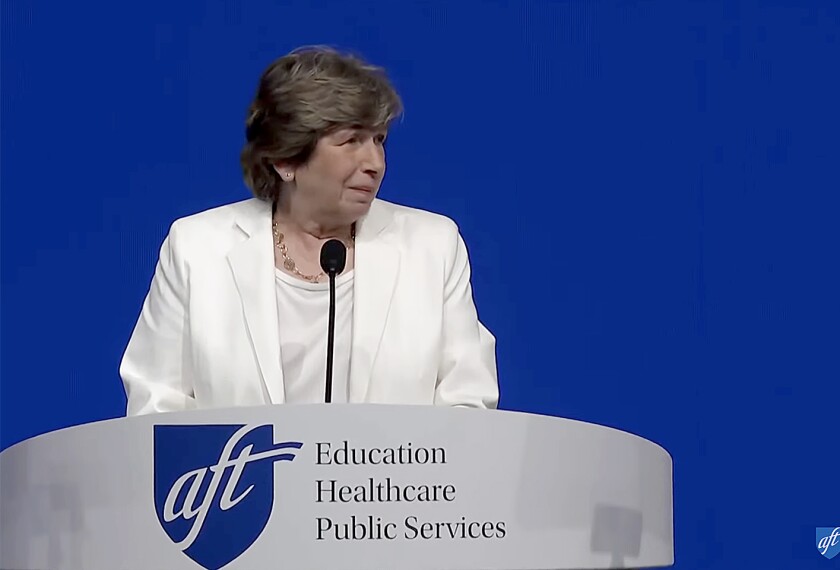Senators from both sides of the aisle grilled Secretary of Education Margaret Spellings at a hearing last week over President Bush’s proposed 2007 budget for education, which would slash spending by 3.8 percent while boosting funds for mathematics and science education.
Sen. Arlen Specter, R-Pa., the chairman of the Senate Appropriations subcommittee that oversees education funding, asked Ms. Spellings to urge her administration colleagues to seek more money for education.
“There’s a real need for someone in your position to be a tough advocate for your department,” Mr. Specter said at the March 1 hearing.
But Secretary Spellings defended the administration’s budget proposal, which was released last month and would cover the fiscal year that begins Oct. 1. If approved by Congress, it would amount to the largest percentage cut for Department of Education programs since fiscal 1996. The administration proposes to eliminate 42 programs in the department’s budget, many of which have broad congressional support. (“President’s Budget Would Cut Education Spending,” Feb. 15, 2006.)
Ms. Spellings said the president’s budget proposal would help the federal government rein in overall spending by targeting money toward areas most closely aligned with the goals of the No Child Left Behind Act, including the proposed $380 million math and science initiative.
But while both Sen. Specter and Sen. Tom Harkin of Iowa, the ranking Democrat on the Subcommittee on Labor, Health and Human Services, Education, and Related Agencies, said they supported Mr. Bush’s goal of increasing support for math and science education, they disagreed with his plan for how to pay for it.
Sen. Specter noted that districts could have a tough time meeting the requirements of the federal school improvement law—the centerpiece of President Bush’s education agenda—without the support of many of the programs slated for elimination.
“A lot of these programs address what we are trying to deal with in No Child Left Behind,” he said, adding that the administration’s proposal amounted to “robbing Peter to pay Paul.”
Tutoring Proposal
Lawmakers from both parties indicated they would champion many of the programs the president placed on the chopping block. Most of them were also slated for elimination last year, but were spared by Congress.
Sen. Herb Kohl, D-Wis., called attention to the administration’s proposal to zero out the Perkins vocational education program, which Congress voted overwhelmingly to renew last year. Sen. Specter said he would work to provide money for the Gaining Early Awareness and Readiness for Undergraduate Programs, or GEAR UP, which help prepare needy students for college. In fiscal 2006, vocational education is receiving $1.18 billion, while GEAR UP is getting $303.4 million.
But Secretary Spellings said that states could still finance those programs under President Bush’s proposal to provide $1.5 billion to improve high school instruction for struggling students. That plan would give states some flexibility in choosing the programs that work best for them, she said.
The president introduced a similar high school initiative last year, but it fell flat in Congress.
Members of the appropriations subcommittee also gave a chilly reception to a Bush administration budget proposal that would provide $100 million to provide summer programs and tutoring services for students whose schools have not made adequate yearly progress under the No Child Left Behind law for at least six years.
The administration touts the program as a way for students in such schools to get academic help, without having to transfer to another school.
“It makes more sense,” Ms. Spellings said of the proposal. “Before we ship them off, let’s get them additional remediation.”
But when pressed by Sen. Specter, the secretary acknowledged that high-quality supplemental services might not be available in every school district. Mr. Specter told her that was “not satisfactory.”
Enhanced Pell Grants
Meanwhile, a Democratic lawmaker took the opportunity to grill Ms. Spellings about a matter unrelated to the budget proposal. Sen. Patty Murray of Washington state asked how the Education Department planned to determine which students are eligible for extra Pell Grant money provided under the Deficit Reduction Act of 2005, which passed earlier this year. That measure would allow students who take a “rigorous high school curriculum” to receive enhanced Pell Grants. Congress left it up to the secretary to decide which courses would meet that criterion, and critics have worried that the language could give the Education Department broader authority over high school curricula. (“Bill Pushes ‘Rigorous’ Curricula,” Feb. 1, 2006.)
“That’s a great question,” Ms. Spellings said, adding that the department was wrestling with how to implement the provision “while being very respectful of our prohibition ... from prescribing curriculum.”
She said the department had consulted with the National Governors Association and others on the issue and had considered using things that are widely accepted such as Advanced Placement, the International Baccalaureate, and the State Scholars program to implement the program.
But Sen. Murray pointed out that not all students have access to such courses or to the State Scholars program, which is currently offered in 14 states.
“I’m very concerned about a large amount of money going to a few kids who happen to be in the right high school with the right curriculum,” she said.





